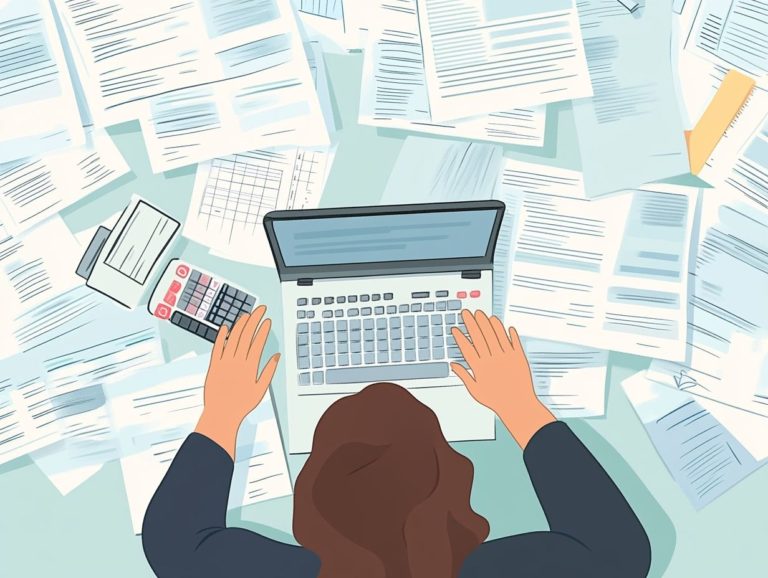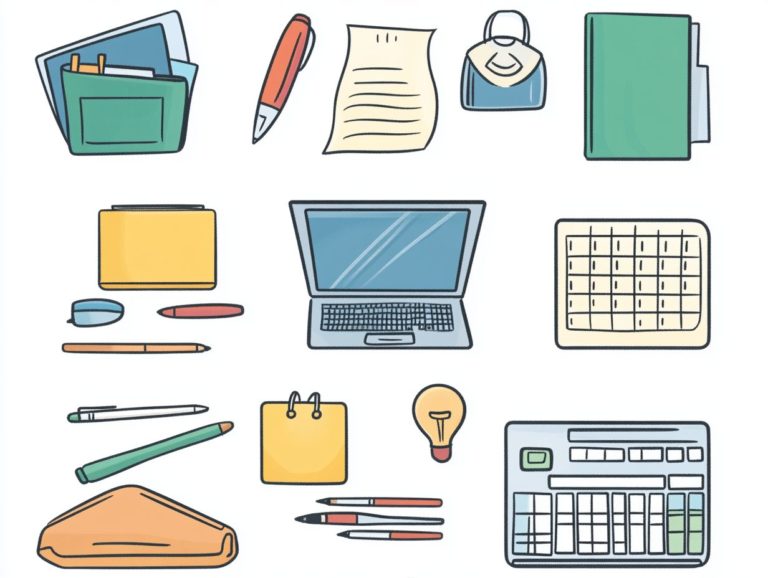How to Save for Taxes as a Freelancer
Freelancing grants you the freedom and flexibility to shape your own career, yet it brings along distinct tax responsibilities that cannot be overlooked. Grasping your tax obligations is vital to sidestep unexpected surprises and penalties.
This article delves into the specific tax requirements that freelancers face, highlighting the advantages of setting aside funds for taxes and offering practical budgeting strategies tailored to your needs.
Uncover how to optimize your deductions, organize your records with precision, and adopt savvy saving techniques. Arm yourself with the knowledge necessary to navigate tax season with both confidence and ease!
Contents
- Key Takeaways:
- Understanding Tax Obligations for Freelancers
- Benefits of Saving for Taxes
- Creating a Budget for Taxes
- Strategies for Saving for Taxes
- Maximizing Tax Deductions
- Staying Organized and Prepared for Tax Season
- Frequently Asked Questions
- What business expenses can I deduct as a freelancer when saving for taxes?
- How much should I set aside for estimated taxes as a freelancer?
- What are estimated taxes and do I need to make them?
- Can I contribute to a retirement account as a freelancer to save on taxes?
- What are some tips for budgeting and saving for taxes as a freelancer?
- What happens if I can’t pay my taxes as a freelancer?
Key Takeaways:

- Understand your tax obligations as a freelancer to avoid penalties and surprises.
- Save for taxes to stay on top of your financial responsibilities and budget effectively.
- Maximize tax deductions by keeping track of expenses that can be deducted.
Understanding Tax Obligations for Freelancers
Understanding your tax obligations is essential as you navigate the complexities of filing your tax returns, ensuring compliance with IRS regulations, and maximizing your potential write-offs. Unlike traditional employees who receive a W-2 form, you typically receive a 1099, which outlines your income and requires a different approach to tax planning.
This guide will delve into the unique tax requirements you face, including taxes for freelancers which cover Social Security and Medicare and the necessary documentation like Schedule C, the form used for reporting income and expenses. For more insights, check out the essential tax documents every freelancer should keep. Ultimately, it aims to demystify the process and enhance your financial literacy.
Different Tax Requirements for Freelancers
Freelancers face unique tax requirements that set them apart from traditional employees, primarily due to their self-employed status and the necessity of navigating forms like the 1099 and Schedule C.
These forms play a vital role in documenting your income and expenses, ensuring you meet your tax obligations. If you earn above a set amount, clients will send you a 1099 form. This form shows what you earned during the year. To accurately report your business income and eligible deductions, you’ll need to complete Schedule C as part of your annual tax return.
It’s important to know that your net earnings are subject to taxes for freelancers. This tax can have a significant impact on your overall income, making meticulous record-keeping and strategic tax planning essential for maintaining financial stability.
Benefits of Saving for Taxes
Saving for taxes offers invaluable advantages for freelancers, giving them the power to manage their finances with finesse, avoid pesky penalties, and adopt proactive tax planning strategies that can lead to significant savings.
By setting aside a portion of their income for estimated taxes, freelancers can reduce the risk of unexpected financial strains during tax season. This strategic method improves cash flow management and facilitates smarter allocation of resources toward retirement accounts and other tax-advantaged financial products available from various institutions. For more on this topic, consider navigating quarterly taxes as a freelancer.
Avoiding Penalties and Surprises
Avoiding penalties and unexpected financial surprises is crucial for freelancers. Effective tax planning significantly reduces these risks, especially when seeking professional guidance or legal advice.
Navigating the complexities of taxes for freelancers may seem overwhelming, especially when you have unpredictable income streams to consider. Many freelancers stumble into common traps, like underestimating their tax liabilities or failing to set aside enough money for quarterly estimated tax payments. To avoid these pitfalls, it’s crucial to be aware of the top tax mistakes freelancers make. This oversight can lead to unwelcome surprises come tax season and may even result in hefty penalties.
By embracing a meticulous planning approach, you can stay ahead of your tax obligations, ensuring a balanced cash flow and minimizing stress as deadlines loom. Proactively managing your finances not only protects you from unexpected charges but also cultivates a sense of security throughout your entrepreneurial journey.
Don t wait until tax season to prepare! Start organizing your finances now!
Creating a Budget for Taxes

Establishing a budget for taxes is crucial for freelancers. It enables thorough financial planning that includes income, expenses, and potential tax savings throughout the year.
By diligently tracking your revenue and expenditures, you can accurately assess your tax obligations. Set aside enough funds for estimated taxes.
This proactive budgeting approach alleviates financial pressure during tax season. It also empowers you to make strategic investments in retirement accounts and health savings accounts (HSAs).
Ultimately, this fosters a more secure financial future for you.
Calculating and Allocating Funds
Calculating and allocating funds for taxes is essential for freelancers. It ensures you have enough resources to meet your tax obligations.
Start by determining your total income, including payments from clients and any side projects you ve taken on.
Once you have your total income, deduct eligible expenses such as equipment purchases, software subscriptions, and home office deductions. These deductions lower your taxable income.
After calculating your net income, assess your tax bracket and estimate your tax liabilities. A good strategy is to set aside 25-30% of your earnings for taxes, ideally in a separate savings account.
This approach ensures you have funds ready for tax payments and helps you budget more effectively throughout the year.
Strategies for Saving for Taxes
Effective strategies for tax savings can greatly enhance your financial health as a freelancer. They enable you to set aside funds in a tax-efficient manner while maximizing your tax benefits.
By leveraging tax-efficient accounts like health savings accounts (HSAs) and retirement accounts, you can save for potential tax liabilities and build a solid foundation for long-term financial security.
These strategies empower you to take charge of your finances. They reduce the stress of tax season and ensure you re prepared for whatever comes your way.
Options for Setting Aside Funds
Freelancers have various options for setting aside funds for taxes. Incorporating tax-efficient accounts like Health Savings Accounts (HSAs) and retirement accounts can significantly enhance your financial strategy.
Among the choices available, HSAs and Individual Retirement Accounts (IRAs) stand out. They offer tax-free contributions and tax deductions on eligible expenses.
By using HSAs, you save for medical expenses while enjoying tax-free contributions and withdrawals. This maximizes your savings potential.
Retirement accounts like Solo 401(k)s (a retirement plan for self-employed individuals) and SEP IRAs provide powerful avenues for long-term growth. They allow significant contributions annually, helping decrease your taxable income.
Understanding and comparing these options is crucial for freelancers eager to build a robust financial foundation while minimizing tax liabilities.
Maximizing Tax Deductions
Maximizing tax deductions is essential for freelancers. It empowers you to lower your taxable income and reduce your tax liability.
By knowing what qualifies as a deductible expense such as business expenses, home office deductions, advertising, and travel you can leverage the tax benefits available to you.
This strategic mindset enhances your tax planning and promotes responsible financial management. It enables you to allocate your resources more efficiently and effectively.
Expenses That Can Be Deducted

Understanding the various expenses that can be deducted from your taxable income is crucial for freelancers like you. Think home office expenses, travel costs, advertising fees, and other essential business expenditures.
By keeping a close eye on these deductible expenses, you can optimize your tax situation. This helps maximize your allowable deductions.
Writing off costs such as software subscriptions, professional development courses, and even a portion of your utility bills can lead to significant savings.
Many independent workers often overlook small expenditures like office supplies and mileage, but these can add up to substantial amounts. Using digital tools and apps designed for tracking expenses will help you maintain accurate records.
Regularly reviewing and organizing your receipts can streamline the tax filing process, making it easy to substantiate your claims. This diligence ensures compliance and gives you peace of mind during tax season.
Staying Organized and Prepared for Tax Season
Staying organized and prepared for tax season is essential for you as a freelancer. It gives you the power to manage your financial records efficiently and sidestep last-minute stress when it s time to file your taxes.
Effective record-keeping and bookkeeping practices allow you to track your income, expenses, and deductions, ensuring that all necessary documentation is readily available.
By adopting systematic filing techniques, you can streamline your tax preparation process, setting the stage for a smoother tax season.
Record-Keeping and Filing Tips
Effective record-keeping and filing tips are essential for you as a freelancer, ensuring that all your financial information is easily accessible come tax season. With the right approach, you can simplify your workload, reduce stress, and maximize your potential deductions, including business expenses.
Choosing between digital and paper records is a crucial decision. While digital formats provide convenience and quick access, paper records serve as reliable backups.
Establishing a systematic organization method is vital. Utilizing both physical and digital folders can help you categorize your expenses and income efficiently.
Regularly reviewing and updating your records will ensure accuracy and make tracking receipts and invoices simple. By implementing a consistent filing schedule, you can streamline your process, making tax planning much more manageable.
Frequently Asked Questions
What business expenses can I deduct as a freelancer when saving for taxes?
As a freelancer, you can deduct several business expenses from your taxes, including home office expenses, business supplies, travel expenses, and education expenses. Make sure to keep track of all your expenses throughout the year to maximize your deductions.
How much should I set aside for estimated taxes as a freelancer?

It’s recommended to set aside at least 25-30% of your income for taxes as a freelancer. This amount may vary depending on your location and tax bracket, so it’s best to consult with tax professionals for more accurate tax advice.
What are estimated taxes and do I need to make them?
Estimated quarterly tax payments are payments made to the Internal Revenue Service (IRS) four times a year to cover your tax liability as a freelancer. If you expect to owe more than $1,000 in taxes for the year, you are required to make estimated quarterly tax payments to avoid penalties.
Can I contribute to a retirement account as a freelancer to save on taxes?
Yes, freelancers can contribute to a retirement account, such as a traditional IRA or a Solo 401(k), to save on taxes. These contributions are tax-deductible and can help lower your taxable income.
What are some tips for budgeting and saving for taxes as a freelancer?
As a freelancer, keeping track of your income and expenses is essential. Set aside part of your income in a separate savings account for taxes.
Consider using accounting software to budget effectively and track your finances.
What happens if I can’t pay my taxes as a freelancer?
If you can t pay your taxes in full, file your tax return on time to avoid penalties. Contact the IRS to set up a payment plan or explore options to settle your tax debt.
One option is an “offer in compromise,” which allows you to settle your debt for less than the full amount.






